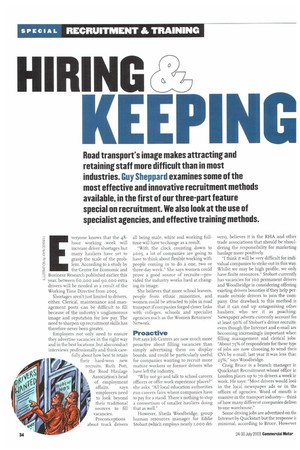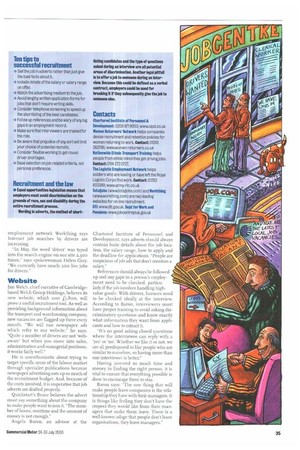HIRING KEEP NG
Page 34

Page 35

If you've noticed an error in this article please click here to report it so we can fix it.
Road transport's image makes attracting and retaining staff more difficult than in most industries. Guy Sheppard examines some of the most effective and innovative recruitment methods available, in the first of our three-part feature special on recruitment. We also look at the use of specialist agencies, and effective training methods.
veryone knows that the 48hour working week will increase driver shortages but many hauliers have yet to grasp the scale of the problem. According to a study by the Centre for Economic and Business Research published earlier this year, between 60,000 and 90,000 extra drivers will be needed as a result of the Working Time Directive from 2005.
Shortages aren't just limited to drivers, either. Clerical, maintenance and management posts can be difficult to fill because of the industry's unglamorous image and reputation for low pay. The need to sharpen up recruitment skills has therefore never been greater.
Employers not only need to ensure they advertise vacancies in the right way and in the best locations ,but also conduct interviews professionally and think carefully about how best to retain their hard-won new recruits. Ruth Pott, the Road Haulage Association's head of employment affairs, says employers need to look beyond their traditional sources to fill vacancies. Preconceptions about truck drivers all being male, white and working fulltime will have to change as a result.
"With the clock counting down to 2005, a lot of companies are going to have to think about flexible working with people coming in to do a one, two or three-day week." She says women could prove a good source of recruits—provided the industry works hard at changing its image.
She believes that more school leavers, people from ethnic minorities, and women could be attracted to jobs in road transport if companies forged closer links with colleges, schools and specialist agencies such as the Women Returners' Network.
Proactive
Port says lob Centres are now much more proactive about filling vacancies than simply advertising them on display boards, and could be particularly useful for companies wanting to recruit more mature workers or former drivers who have left the industry.
"Why not go and talk to school careers officers or offer work experience places?" she asks. "All local education authorities run careers fairs where companies have to pay for a stand. There's nothing to stop a consortium of smaller hauliers doing that as well."
However, Sheila Woodbridge, group human resources manager for Eddie Stobart (which employs nearly L000 dri
vers), believes it is the RHA and other trade associations that should be shouldering the responsibility for marketing haulage more positively.
"I think it will be very difficult for individual companies to strike out in this way. Whilst we may be high profile, we only have finite resources." Stobart currently has vacancies for roo permanent drivers and Woodbridge is considering offering existing drivers bounties if they help persuade outside drivers to join the cornparty. One drawback to this method is that it can end up antagonising othet hauliers, who see it as poaching Newspaper adverts currently account fot at least 90% of Stobart's driver recruits, even though the Internet and e-mail are becoming increasingly important when filling management and clerical jobs. "About 75% of respondents for these type of jobs are now choosing to send theit CVs by e-mail; last year it was less than 25%," says Woodbridge.
Craig Bruce is a branch manager ir Quickstart Recruitment whose office ir London places up to 70 drivers a week ir. work. He says: "Most drivers would loot in the local newspaper ads or in the offices of agencies. Word of mouth it massive in the transport industry— third, of how many different companies delive, to one warehouse."
Some driving jobs are advertised on the Internet by Quickstart but the response it minimal, according to Bruce. However employment network Workthing says Internet job searches by drivers are increasing.
"In May, the word 'driver' was typed into the search engine on our site 2,500 times," says spokeswoman Helen Gray. "We currently have nearly 200 live jobs for drivers."
Website
Jim Welch, chief executive of Cambridge. based Welch Group Holdings, believes its new websitc, which cost L'1,800, will prove a useful recruitment tool. As well as providing background information about the transport and warehousing company, new vacancies are flagged up there every month. "We will run newspaper ads which refer to our website," he says. "Quite a number of drivers are not 'webaware' but when you move into sales, administration and managerial positions, it works fairly well."
He is unenthusiastic about trying to target specific areas of the labour market through specialist publications because newspaper advertising eats up so much of the recruitment budget. And, because of the costs involved, it is imperative that job adverts are drafted properly.
Quickstart's Bruce believes the advert must say something about the company to make people want to join it. "The number of hours, overtime and the amount of money is not enough."
Angela Baron, an advisor at the Chartered Institute of Personnel and Development, says adverts should always contain basic details about the job location, the salary range, how to apply and the deadline for applications. "People are suspicious of job ads that don't mention a salary."
References should always be followed up and any gaps in a person's employment need to be checked, particularly if the job involves handling highvalue goods. With drivers, licences need to be checked ideally at the interview. According to Baron, interviewers must have proper training to avoid asking discriminatory questions and know exactly what information they want from applicants and how to extract it.
"It's no good asking closed questions where the interviewee can reply with a 'yes' or 'no'. Whether we like it or not, we are all predisposed to like people who are similar to ourselves, so having more than one interviewer is better."
Having invested so much time and money in finding the right person, it is vital to ensure that everything possible is done to encourage them to stay.
Baron says: "The one thing that will make people leave companies is the relationship they have with their managers. It is things like feeling they don't have the respect they would like from their managers that make them leave. There is a well-known adage that people don't leave organisations, they leave managers.'




























































































































































